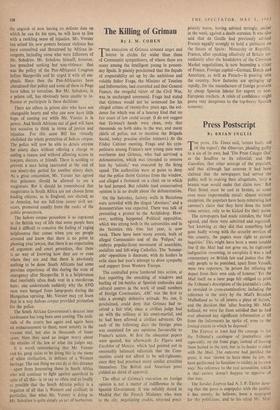Barbarism
By KENNETH MACKENZIE
IT is difficult to imagine a more refined form of torture than to wait until a man is within days of completing a long prison sentence and then announce that he is not going to be released after all, but will be kept in gaol indefinitely.
That is what Mr. Vorster, the South African Minister of Justice, proposes to do to Mr. Robert Mangaliso Sobukwe, the leader of the Pan-Africanist Congress, who was due to be released this weekend after three years in gaol. In the meantime, Mr. Vorster has rushed through Parliament a Bill which, among other things, gives him the power to prolong in- definitely the imprisonment of people convicted of crimes against the State (after a year he will have to get the consent of Parliament). Mr. Vorster said, in introducing the Bill, that Mr. Sobukwe would be a suitable person to be dealt with under these powers, for he had not had a 'change of heart' while in prison.
Mr. Sobukwe was sentenced because he incited people to take part in a non-violent campaign against the pass laws in 1960—the campaign that led the police to open fire at Sharpeville and kill sixty-nine people. Mr. Sobukwe is thirty-nine; he has a BA degree and was lecturer in African studies at the University of the Wit- watersrand before he resigned to lead the anti- pass campaign. He is married—his wife is a nurse—and he has four children. He is said to be a man of sensitivity and intellect, respected by many people who disagree with his politics.
In addition to the torment of having the hope that has presumably helped to keep him alive these last three years suddenly frustrated and the anguish of now having no definite date on which he can fix his eyes, he will have to live with a rankling sense of injustice. Mr. Vorster has seized his new powers because violence has been committed and threatened by African in- surgents, including some who were followers of Mr. Sobukwe. Mr. Sobukwe himself, however, has preached nothing but non-violence: that was the policy of the Pan-Africanist Congress before Sharpeville and he urged it with all em- phasis. Since then the Pan-Africanists have abandoned that policy and some of them in Poqo have taken to terrorism. But Mr. Sobukwe, in a prison cell, has obviously been unable to in- fluence or participate in these decisions.
There are others in prison also who have not changeable hearts and who can now have little hope of coming out while Mr. Vorster is in power. And South Africans out of gaol will have less occasion to think in terms of justice and injustice. For this same Bill has virtually abolished the whole protection of habeas corpus. The police will now be able to detain anyone for ninety days without offering a charge or stating a reason and without allowing access to lawyers, doctors or friends. There is nothing to prevent a man being rearrested at the end of one ninety-day period for another ninety days. As 'a great concession, Mr. Vorster has agreed that prisoners should be allowed to see a magistrate. But it should be remembered that magistrates in South Africa are not chosen from leading citizens, as in England, nor elected, as in America, but are full-time career civil ser- vants, promoted usually from the ranks of the public prosecutors.
The habeas corpus procedure is so ingrained in the British way of life that some people here find it difficult to conceive the feeling of raging helplessness that comes when you see people arrested and know that there is no point in phoning your lawyer, that there is no expectation of argument and court procedure, that there is no way of knowing how they are or even where they are and that there is absolutely nothing to be done. South Africans had some previous experience of this during the state of emergency after Sharpeville. It is a helplessness that inevitably often finds vent in a murderous hate: one understands suddenly why the AVO men were hanged from lamp-posts during the Hungarian uprising. Mr. Vorster may yet learn that in a way habeas corpus provided protection for the police.
The South African Government's descent into lawlessness has long been seen coming. The recti- tude of the courts has again and again been an embarrassment to them, most notably in the treason trial, but also in thousands of lesser cases. Now they need no longer worry about the niceties of the law or what the judges say. It is worth remembering that Mr. Vorster and his gang claim to be doing this in the name of white civilisation, in defence of a Western heritage. The one thing we can do at this distance --apart from honouring those in South Africa who will continue to fight against apartheid in spite of all this—is to say as often and as loudly as possible that the South African policy is a negation of all that is Western and civilised; in particular, that what Mr. Vorster is doing to Mr. Sobukwe is quite simply an act of barbarism.







































 Previous page
Previous page